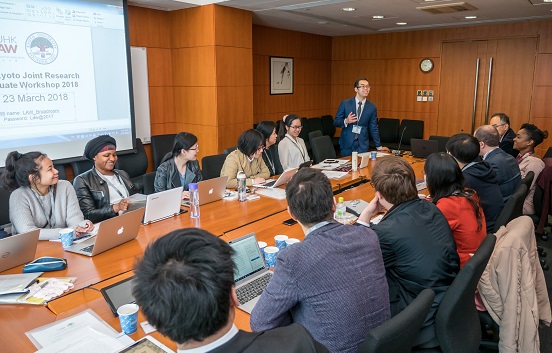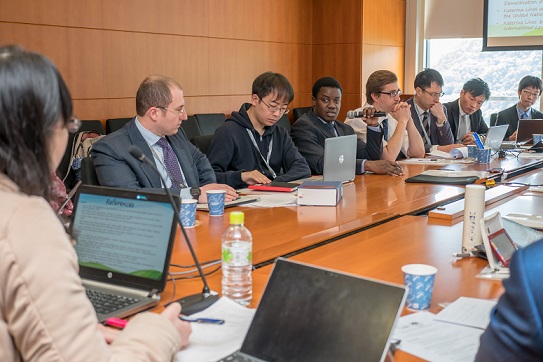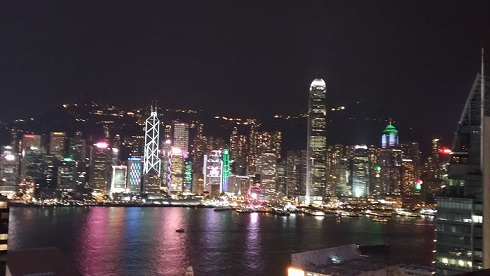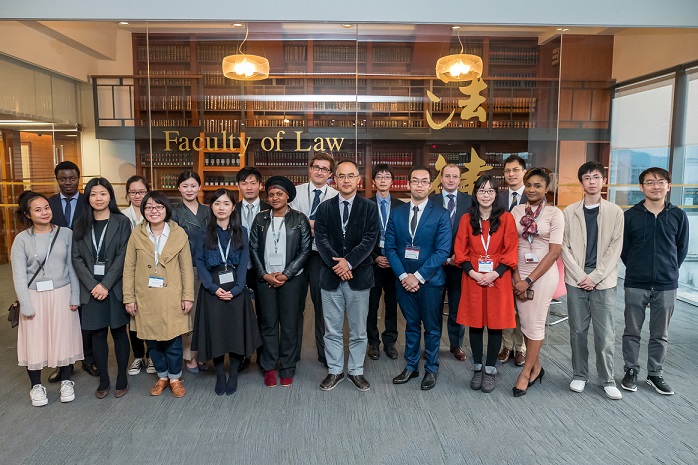 |
Co-organized by |
 |
2018 CUHK-Kyoto Joint Workshop in International Law
 |
Co-organized by |
 |
Workshop Report by Miharu Hirano (Kyoto)
 Seeing familiar faces of CUHK peers, the third edition of the CUHK-KU workshop started in a relaxed mood. Even for first-time attendees from both sides, there was no need to wait long for friendly conversations to start. Delicious Chinese cuisine at on-campus cafeterias definitely smoothened our talks. Old friends, who had seen sakura (cherry blossoms) together in the evening in Kyoto last year, spent some offline time again viewing the beautiful night city scape of Hong Kong (impossible to share as a photo on SNS).
Seeing familiar faces of CUHK peers, the third edition of the CUHK-KU workshop started in a relaxed mood. Even for first-time attendees from both sides, there was no need to wait long for friendly conversations to start. Delicious Chinese cuisine at on-campus cafeterias definitely smoothened our talks. Old friends, who had seen sakura (cherry blossoms) together in the evening in Kyoto last year, spent some offline time again viewing the beautiful night city scape of Hong Kong (impossible to share as a photo on SNS).
 Since this joint workshop was the last one for me to participate as a student, I wish to share my thoughts of my past experiences. After a number of opportunities to present and discuss at joint student seminars, I came to note some peculiarities of the joint seminars of this kind. Firstly, making a 20-minute-long presentation is not an easy work. 20 minutes is too short to present the entire paper or a chapter of one’s thesis, but too long for just providing summary and key messages of one’s research; there is enough room to discuss some details. It is impossible to deliver more than one message, if the allocated time is fully used. Hence, the more a student puts effort in preparing and polishing her/his presentation, the simpler and sharper becomes the argument. I came to understand how it has been helpful for me, and also for others; for students at their earlier stage of research, it helps to narrow down their research question, and, for students who progressed with their research, it forces their complicated argument to be kept concise.
Since this joint workshop was the last one for me to participate as a student, I wish to share my thoughts of my past experiences. After a number of opportunities to present and discuss at joint student seminars, I came to note some peculiarities of the joint seminars of this kind. Firstly, making a 20-minute-long presentation is not an easy work. 20 minutes is too short to present the entire paper or a chapter of one’s thesis, but too long for just providing summary and key messages of one’s research; there is enough room to discuss some details. It is impossible to deliver more than one message, if the allocated time is fully used. Hence, the more a student puts effort in preparing and polishing her/his presentation, the simpler and sharper becomes the argument. I came to understand how it has been helpful for me, and also for others; for students at their earlier stage of research, it helps to narrow down their research question, and, for students who progressed with their research, it forces their complicated argument to be kept concise.
.jpeg) Secondly, participants are conducting research in diverse aspects of international law, or even beyond. This has helped me to bring my attention to larger contexts of the issues or basic queries. This time, the workshop welcomed some students and professors with their background in other fields of law. Notably, moderators from CUHK side were Professor Kevin Cheng (criminology) and Professor Bryan Druzin (legal theory). It might have been hard for them to follow international law jargon, but the very fact that they do not share the common language can bring in interesting perspectives. My favourite was the question from a tax law student at CUHK who posed a question in relation to the timing of the production of scientific evidence. At which timing, a State would be required, under its under its continuous obligation under the WTO law, to take some actions—at the time of new scientific finding, at the time of a paper publication, or at the time of reviewing such paper? So practical, but so fundamental!
Secondly, participants are conducting research in diverse aspects of international law, or even beyond. This has helped me to bring my attention to larger contexts of the issues or basic queries. This time, the workshop welcomed some students and professors with their background in other fields of law. Notably, moderators from CUHK side were Professor Kevin Cheng (criminology) and Professor Bryan Druzin (legal theory). It might have been hard for them to follow international law jargon, but the very fact that they do not share the common language can bring in interesting perspectives. My favourite was the question from a tax law student at CUHK who posed a question in relation to the timing of the production of scientific evidence. At which timing, a State would be required, under its under its continuous obligation under the WTO law, to take some actions—at the time of new scientific finding, at the time of a paper publication, or at the time of reviewing such paper? So practical, but so fundamental!
 Lastly, this time, the workshop followed a conventional structure but was shorter than usual—it lasted only a full day and a half. As a result, there was no moderator this time to introduce the twelfth (or even fourteenth) presenter who conventionally starts her/his presentation saying, “I am the last presenter of this intensive workshop”, which turns exhausted faces of participants into satisfied but also slightly sad smiles. The intensity of discussions was high as usual, but surprisingly, I got used to the continuous discussions for two whole days!
Lastly, this time, the workshop followed a conventional structure but was shorter than usual—it lasted only a full day and a half. As a result, there was no moderator this time to introduce the twelfth (or even fourteenth) presenter who conventionally starts her/his presentation saying, “I am the last presenter of this intensive workshop”, which turns exhausted faces of participants into satisfied but also slightly sad smiles. The intensity of discussions was high as usual, but surprisingly, I got used to the continuous discussions for two whole days!
This Workshop was a special one because it was my last activity to attend as a student of Kyoto University. The last spice was added to my wonderful memories when my and some Kyoto friends’ return flight was delayed and we had to stay overnight at Kansai Airport.
